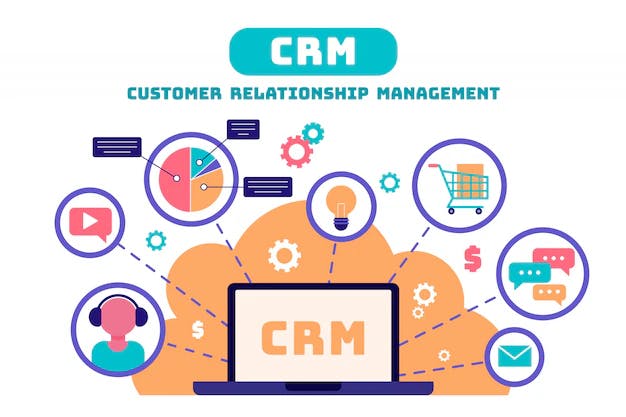What is CRM Customer Relationship Management?
It’s a comprehensive approach to managing and nurturing relationships with customers. It involves the use of technology, strategies, and processes to analyze customer interactions throughout the entire lifecycle. The primary goal of CRM is to improve customer satisfaction, increase customer retention, and ultimately drive business growth.
Key Components of CRM:
Centralized Customer Database:
A CRM system centralized customer data, providing a unified view of customer interactions, purchase history, preferences, and contact information.
Sales Automation:
CRM systems often include features for sales automation, helping teams manage leads, opportunities, and sales pipelines more efficiently.
Marketing Automation:
CRM facilitates targeted marketing campaigns by automating processes like email marketing, lead nurturing, and customer segmentation.
Customer Support and Service:
CRM systems assist in managing customer support by tracking service requests, providing a knowledge base, and enabling efficient issue resolution.
Analytics and Reporting:
CRM tools offer analytics and reporting features to analyze customer behavior, track performance metrics, and derive insights for informed decision-making.
Integration Capabilities:
CRM solutions can integrate with other business applications, such as email, calendars, and accounting software, to ensure seamless data flow across the organization.
Why is CRM Important for SMBs?
Customer-Centric Approach:
SMBs can adopt a customer-centric approach by using CRM to understand customer needs, preferences, and behaviors. This helps in tailoring products and services to meet customer expectations.
Improved Communication:
CRM enables SMBs to maintain consistent and personalized communication with customers. This includes targeted marketing messages, follow-ups, and timely responses to inquiries.
Enhanced Customer Retention:
By tracking customer interactions and understanding their needs, SMBs can implement effective retention strategies. CRM systems help identify at-risk customers and provide opportunities for proactive engagement.
Streamlined Sales Processes:
SMBs can streamline their sales processes with CRM, from lead management to closing deals. Automation features simplify repetitive tasks, allowing sales teams to focus on building relationships and closing more deals.
Marketing Efficiency:
CRM supports SMBs in creating and executing targeted marketing campaigns. Automation tools help deliver the right message to the right audience, increasing marketing efficiency and ROI.
Data Centralization and Accessibility:
CRM centralized customer data, making it easily accessible to authorized team members. This ensures that everyone involved in customer interactions has access to up-to-date and relevant information.
Scalability:
CRM solutions for SMBs are often scalable, allowing businesses to start with essential features and expand as they grow. This adaptability ensures that the CRM system can evolve with changing business needs.
Competitive Edge:
SMBs can gain a competitive edge by leveraging CRM to enhance customer satisfaction and provide personalized experiences. A well-implemented CRM strategy can differentiate a business in the marketplace.
Data-Driven Decision-Making:
CRM provides valuable insights through analytics and reporting. SMBs can make informed decisions based on data, enabling continuous improvement and strategic planning.
Efficient Collaboration:
CRM systems facilitate collaboration among teams by centralizing information. Sales, marketing, and customer service teams can work together seamlessly to enhance the overall customer experience.
In summary:
Having one place for all your biggest assets, your customers, is priceless for any business. For SMBs, it’s a necessity that is usually overlooked. Having an easy way to see your customer details, buying behaviors, engagement, and more at a glance is critical to maintaining a successful business.
CRM is vital for SMBs as it empowers to build stronger customer relationships, streamline business processes, and stay competitive in the dynamic business environment. It serves as a valuable tool for understanding customer needs, improving efficiency, and driving sustainable growth.
The important thing to remember about CRM is that you need it to be simple, with no tech stack and heavy technical requirements. It needs to be secure, friendly, and easy to use. It needs to work for you and not the other way around.

Sharing our mission:
Making it simple is key for us.
The focus is on having a great UI/UX and making it really intuitive and friendly to work with our CRM component.
All the information you need is provided in one screen, making it easy to stay in touch and understand all aspects of a specific customer engagement on an individual level.
Service is a vital part of your brand, a cornerstone of your value, and a reason why people will choose to continue engaging with your brand.
We don’t take it lightly.”


